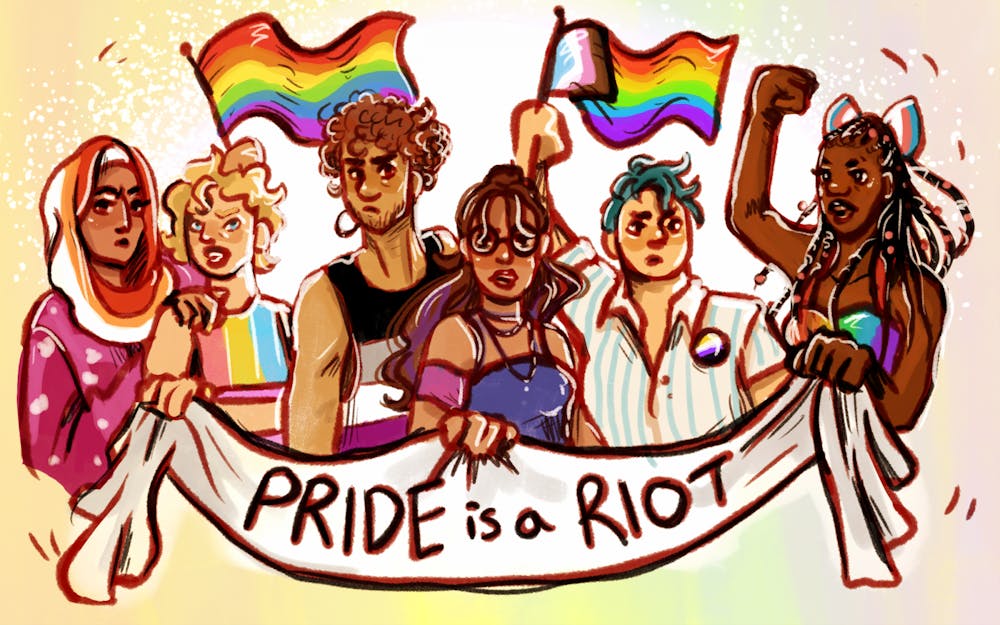June 28, 1969 changed the course of queer history forever.
Many of us know the story. After a police raid, patrons of the New York City gay bar Stonewall Inn, fed up with years of harassment, fought back. They rioted, throwing impromptu projectiles at the police and finally making their voices heard. The protests and riots lasted for five more days.
The aftermath of the Stonewall Uprising was the beginning of the modern gay rights movement. It sparked various organizations and groups who radically fought for the acceptance of queer people. And, of course, it birthed Pride marches, the first of which was held on June 28, 1970 – the first anniversary of the uprising.
Since then, a lot has changed. Same-sex marriage is now allowed in all 50 states. As of last year, 64% of Americans support laws protecting transgender people from discrimination.
However, a lot still hasn’t changed. In the 2023 legislative session, 72 anti-LGBTQ bills were passed into law across the states. Presidential candidates are using transphobic talking points to get votes. Frankly, it feels like we’re going backward.
[Related: OPINION: This Pride Month, reject rainbow capitalism]
In the face of growing discrimination, we need to look to our past. The relative freedom queer people enjoy today was won by radical people who often weren’t afraid to get messy with their activism. We need to fight for our rights just as our queer ancestors did decades ago or we’re going to lose them for good.
In the wake of Stonewall, LGBTQ activism groups sprouted up across New York City and the country. The Gay Liberation Front (GLF) was just one. The group organized protests and fundraisers to help support the LGBTQ community at large.
The GLF focused on radical politics, fighting against the heteronormative, white supremacist society that oppressed its members. Though the organization was short-lived, its work inspired further coordination and conversation between queer activists.
There was the Street Transvestites Action Revolutionaries, a group founded on mutual aid by Marsha P. Johnson and Sylvia Rivera. In a time when many transgender people had to turn to prostitution to make ends meet, the organization worked to provide housing and basic needs to transgender people across New York City.
There was also the Gay Activists Alliance, which utilized the media to draw attention to LGBTQ issues. The group organized protests and “zaps” – guerrilla demonstrations designed to pull in the press – to fight back against oppression at the governmental level.
This isn’t to say that these groups were without fault – that’s why there were so many of them. Many queer activists groups at the beginning of the modern gay rights movement were plagued by the same internal controversies that plague the queer community today.
However, even if they split the movement into fragments, these controversies and questions are necessary. We always need to be pushing our understanding of liberation forward by learning from the perspectives of others. You can’t understand everything simply through your own experience.
There is a throughline between all these myriad groups – revolution. While they may have varied on the political spectrum, all of them were doing something completely radical for the time – being openly queer and being proud about it. None of them would compromise when it came to queer liberation.
[Related: OPINION: Transgender medical care shouldn't be banned – it should be free]
Post-Stonewall activism influenced more iconic organizations of the gay rights movement, including the AIDS Coalition to Unleash Power (ACT UP). ACT UP helped bring attention to the governmental mishandling of the AIDS crisis and fought for acceptance of the people it affected. In a time where information about AIDS was limited and fear was rampant, ACT UP brought radical resistance.
Today, as our rights are under attack, we need to remember the past of our movement, both their mistakes and their successes. We cannot compromise when it comes to our liberation. We cannot sell each other out to our white supremacist society just to get a bit more acceptance. Either we all get freedom, or none of us do.
So as you head to Pride this year and beyond, celebrate who got us here. Connect with the community around you and help out your queer neighbors. We all need each other a lot more than we think.
Danny William (they/them) is a sophomore studying media.




